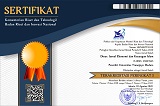Mapping Muslim Behaviors Through Attitudes And Intentions In Choosing Cash Waqf For Economic Independence
Abstract
Keywords
Full Text:
PDFReferences
Aedy, H. Hasan, 2005. Peranan Pemerintah dan Ulama dalam Pengelolaan Pajak, Zakat dan Wakaf untuk Penanggulangan Kemiskinan dan Peningkatan Ekonomi Umat. Proceeding of International Seminar On Islamic Economics As A Solution, IAEI Medan 18-19 September.
Al-Arif, Potensi Wakaf Tunai Serta Dampaknya Terhadap Perekonomian, http://www.academia.edu
Alisuddin, 2002. Zakat atas Tabungan. Mon Mata, Jurnal Ilmu-ilmu Ssial Bidang Ekonomi. Vol 4 No. 2 Desember 2002. Hal 89 -100
Amalia Euis 2009, Keadilan Distributif Dalam Ekonomi, Jakarta, PT. Raja Grafindo Persada
Amani, farouk & Abbes Ikram. 2014. The Influence of Individual Factors The Entrepreneurial Intention. 2014. International Journal of Managing Value and Supply Chains (IJMVSC) Vol. 5 No. 4 Desember. Pp. 47-57 .
Arikunto, Suharsimi.2006. Prosedur Penelitian Suatu Pendekatan Praktek. Jakarta : PT Renika Cipta.
Azjen,I. & Fishbein,M (2005). The Influence of Attitudes on Behavior. In D. Albarrcin, B.T. Johnson & M.P. Zanna (Eds). The handbook of attitudes (pp.173-221) Mahwah, NJ : Erlbaum.
Bapeda Gunung Kidul, Program Pemberdayaan Ekonomi Masyarakat, 2014
Chamid, Nur. 2009. Membangun Masyarakat Madani : Upaya Mendukung Pemberdayaan Basic Sistem Ekonomi Islam Menurut Ibnu Khaldun Economic Model. Jurnal Empirisima. Vol 18. No. 1 Januari 2009. Hal 101 – 112
Fanani, Muhyar. 2011. Pengelolaan wakaf Tunai. Walisongo Jurnal Penelitian Sosial keagamaan. Vol. 19 No. 1.
Farhah binti Saefudin , et.all. 2014. The Role of Cash Waqf in Poverty Alleviation : Case of Malaysia. International Journal of Business, Economics and Law. Vol. 4 Issue 1(June) . pp.171- 179.
Fitria Utami, Anisa. Munawar Ismail. 2016. Implementasi pengelolaan wakaf Tunai (Studi Pada Baitul Maal Hidayatullah & Yayasan Dana Sosial al-Falah). Jurnal Ilmiah Mahasiswa FEB Universitas Brawijaya. Vol. 3 No. 1 Semester Ganjil 2014/2015.
Gamal, Merza, 2006, Sedekah Dalam Perspektif Pemberdayaan Ekonomi Umat, Ekonomi Nasional, Edisi Selasa 12 Oktober.
Hasan, Sami, 2006, Muslim Philanttrhropy and Sosial security : Prospects, Practices, and Fitfalls, http//www.istr, org/conferences/Bangkok/WPV Volume.
Khasanah, Umrotul , Waqf a Source of Productive Economic Empowerment (Perspective on Waqf Benefits Based on Islamic Financial System)
Kusrini, Kusuma Chandra Kirana, Idris Purwanto and Arief Laksito, 2018. GIS-Based Decision Support System For Cash Waqh Distribution . Journal of Theoretical and Applied Information Technology. Vol 96 , no. 3. Issue 15 (February) pp 71-77.
Kusuma Chandra Kirana,dkk, 2017. Analisis Faktor Intensi Kewirausahaan Tenaga Kerja Wanita Purna Gunung Kidul Untuk Kemandirian. Jurnal Ekuitas Stesia, Vol 1 No 3 hal. 303.
Sudirman, 2005. Pengembangan Wakaf Tunai untuk keadilan social. Resipetory.uin-malang.ac.id
DOI: https://doi.org/10.21107/dinar.v8i1.8939
Refbacks
- There are currently no refbacks.
Copyright (c) 2021 sri hermuningsih, Kusuma Chandra Kirana, Retno Widiastuti

This work is licensed under a Creative Commons Attribution-ShareAlike 4.0 International License.
Journal Dinar Indexed by:
Dinar: Jurnal Ekonomi dan Keuangan Islam by Universitas Trunojoyo Madura is licensed under a Creative Commons Attribution-ShareAlike 4.0 International License.






.png)










